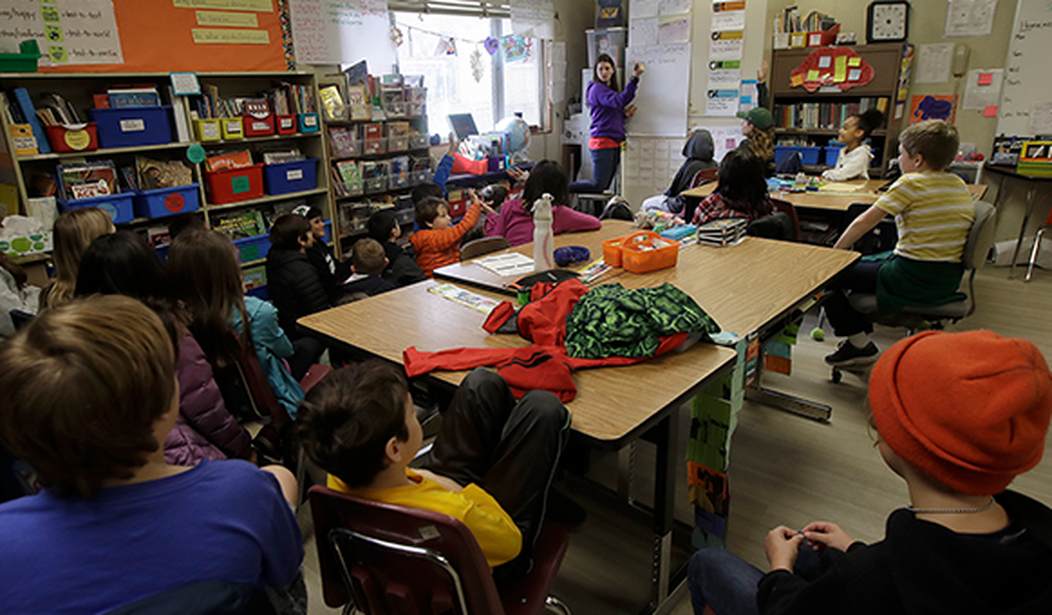“Teachers’ job satisfaction levels appear to have hit an all-time low,” according to Education Week’s coverage of a recent survey of 1,300 teachers. The surveyed teachers report that they still love teaching, but are frustrated with students’ higher academic and social-emotional needs, as well as increased bad behavior and disengagement.
School districts that insisted on keeping schools closed for prolonged periods during the COVID-19 pandemic forced teachers to teach online, requiring them to quickly acquire new lesson plans and classroom management skills. When schools finally opened their doors again, districts made teachers create and enforce socially-distanced classrooms, replacing mat time and group activities with increased screen time and isolating plexiglass dividers. Once cheerful and interactive classrooms became bleak and unhappy places for both teachers and students.
School districts’ COVID-theater policies were created in response to demands from teachers’ unions. The unions spent the entire pandemic fomenting fear and shutting down schools, preventing teachers from effectively educating and meaningfully engaging with students. Now teachers have to pick up the pieces, with students back in classrooms but months behind academically and developmentally, misbehaving, and, in some places, physically violent.
A 2021 survey found that one-third of teachers had been verbally harassed or threatened with violence by a student during the pandemic. The surveyed teachers described the violence in their schools as "on-going and pervasive," with the isolation endured by students while schools were closed “taking a severe toll, one that would follow them as schools began to open back up for in-person learning.” With 80% of teachers reporting that their current students’ social development and emotional maturity are less advanced compared to students prior to the pandemic, clearly both students and teachers will be contending with the consequences of COVID-era school closures for a long time.
Recommended
Teachers in my community’s public schools have experienced a disturbing increase in dangerous student behavior. By early April, police had been called to the Arlington, Virginia, middle school my eldest daughter used to attend 22 times this school year. Local high school students have repeatedly set trash cans on fire, and reports of fighting and weapons have increased in numerous middle and high schools in the county. Despite Arlington Public Schools’ investment in trendy Panorama Education surveys and social-emotional learning (SEL), many of the county’s schools do not provide staff and students with safe and stable environments.
In the midst of the lengthy school closures that resulted in increased violence and chaos in Arlington’s public schools, many parents moved their children to nearby open private schools. Most of us likely won’t return.
I withdrew my children after the school district refused to educate students, even remotely, in spring 2020 and reneged on a plan to open two days a week in fall 2021. My daughters now attend a small and stable faith-based school that remained committed to educating students throughout the pandemic. In stark contrast to our neighborhood public middle school, where an autistic child was recently taunted and physically attacked and students are filming and sharing videos of each other using the restroom, my eighth-grade daughter spends her school day in a safe, caring, and calm environment. She’s diagramming sentences for the first time, completing daily homework assignments, and thriving academically and socially.
My fifth-grade daughter, who really struggled with COVID-era isolation, now has two recesses each day to practice social skills and a structured environment that expects accountability for behavior, character, and academic performance. With Arlington public schools chasing educational fads like eradicating grades and avoiding consequences for misbehavior, her public school teachers were never able to provide the structure and (gentle and caring) discipline the private school offers her.
As a class parent and school volunteer, I’ve been able to regularly observe the teachers at my daughters’ school. They are a remarkable group — friendly, focused, calm, and dedicated. They open the car doors during the morning drop-off and afternoon pick-up; oversee lunch and recess; plan class parties, field trips, and special school events with only minimal support from parents; and respond quickly to parental inquiries. My complex daughters’ teachers really and truly care about them. They clearly want and expect my girls to learn and grow, and they stay laser-focused on that mission each day.
I am particularly grateful for my younger daughter’s fifth-grade teacher. He is about to retire after 40 years of teaching, but his dedication to the school and his students has been an incredible thing to observe this year. He teaches his students every subject, yet also organizes numerous school-wide events, including the joyful Christmas sing-along and the surprisingly fun Bingo night. He’s a remarkable teacher, but perhaps the faith-based schools where he’s worked his whole career provided a supportive environment where he could both serve and thrive.
It remains to be seen if the public school system leaders can fix the problems that their policy decisions created for public school teachers. Thankfully, teachers in small private schools like the one my daughters attend are safe from these harmful policies. As education freedom expands across the country and alternatives to the traditional public school system are created, I hope many more teachers will have the opportunity to work in healthy environments where they can feel safe and appreciated.
Ginny Gentles is director of the Education Freedom Center at Independent Women’s Forum.

























Join the conversation as a VIP Member